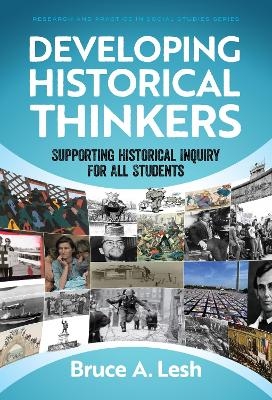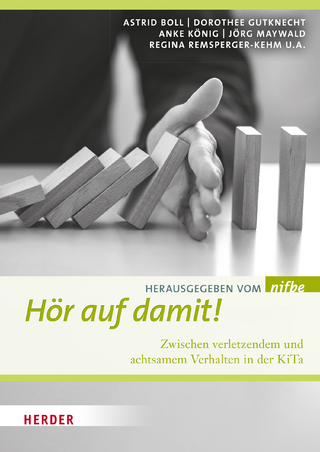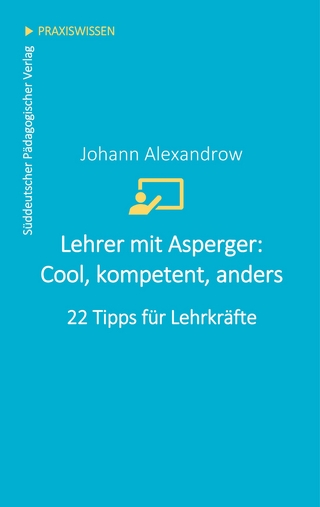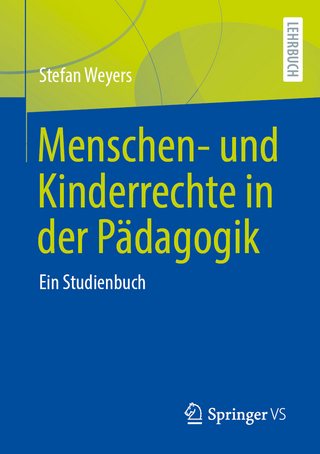
Developing Historical Thinkers
Teachers' College Press (Verlag)
978-0-8077-6877-8 (ISBN)
This practical book addresses the consistent questions that were posed by secondary social studies teachers during professional learning sessions. In particular, it examines ways to break through the inclination and perception expressed by many teachers that “my kids cannot do that.” Drawing on 22 years as a high school history teacher, 7 years as a state-level curriculum specialist, and extensive work with inservice teachers across the country, the author provides research-based guidance for engaging students in investigating the past. Lesh examines ways to develop effective questions that guide historical inquiries, utilize discussion in the classroom, and align assessment to inquiry. He also shows teachers how to incorporate difficult histories within an inquiry framework. Each chapter uses a specific lesson, framed by student work, to illuminate approaches in real classroom scenarios. Topics include the Pullman Strike of 1894, the Marcus Garvey question, Dust Bowl Migrants, the LGBTQ+ fight for rights, and multiple lessons from World War I. This follow-up to the author’s book "Why Won't You Just Tell Us the Answer?" fills in gaps and expands tools and classroom examples to assist today’s teachers.
Book Features:
Offers ways to promote teacher growth as it pertains to historical thinking.
Demonstrates how to align investigating the past with the needs of reluctant readers and students with special needs.
Provides lesson materials and instructional guidance.
Addresses how to teach difficult subjects, such as LGBTQ+ history.
Aligns historical literacy with inquiry-based instruction.
Bruce A. Lesh is a former high school teacher in Baltimore County Public Schools, curriculum director at the Maryland State Department of Education, past president of the Maryland Council for the Social Studies, and vice-chair of the National Council for History Education. He has been recognized as the Organization of American Historians Teacher of the Year, and the Maryland Secondary Social Studies Teacher of the Year. He received the 2024 National Council for History Education (NCHE) Paul Gagnon Prize for a Significant Contribution to the Promotion of History Education.
Contents
Preface ix
Acknowledgments xiii
1. “But My Kids Cannot Do This . . .”: Challenging Perceptions About Historical Investigations 1
My Why, Part I 2
The Stanford History Education Group (SHEG) 6
My Why, Part II 7
The Inquiry Arc 8
Professional Learning 10
The History Lab 2.0 10
The Only Constant Is Change! 18
Conclusion 20
2. “Yes, Your Students Can Do This”: Historical Investigation for All Students 23
A Road Map 25
Teaching Up 27
Build Scaffolds 28
In the Center Ring, Inquiry Versus Coverage and Control 30
Scaffolding to Success 32
Making the Inquiry Question Accessible for All 34
Adapting Historical Sources: Political Cartoons and Images 36
Modifying a Text Source 44
Scaffolding the Process 50
Conclusion 54
3. “Is Every Day a Lab?”: What Happens Between History Labs? 57
The Twinkies of Lessons 58
“Is Every Day a Lab?” 58
Seriously, No Trench Foot, or Tanks, or Mustard Gas? 59
Woven Into Every Unit 62
Where Are the Investigations!? 96
What Happens Between History Labs? 100
4. “Is There an Easy Way to Develop Questions . . . ?”: Sorry, No 103
One-Stop Shopping 104
The Engagement Cliff 104
The Brain and Questions 107
Why Questions in Social Studies? 107
Organizing the Mental Bedroom 108
Types of Questions 109
We Learned That in October—You Mean I Was Supposed to Remember That? 111
Unit-Wide Questions 114
Building Lesson-Level Questions 116
Coverage Demands Choices 118
“Would You Have Your Students Debate Slavery?” 119
Open Versus Closed Questions 119
The People in the Past Were Stupid 121
The Tug of War Between Relevance and Accuracy 122
A Little Sex Appeal Goes a Long Way 122
Historical Categories of Inquiry 123
Types of Questions 124
It Is Iterative and Recursive and Frustrating (But Also Exciting)! 133
Marcus Garvey: The Evolution of a History Lab Question 134
Having Students Develop Their Own Questions 138
Conclusion 141
5. “Discussion Is for Classes Like Foreign Language”: Expanding Discussion in the Classroom to Deepen Student Facility With Historical Thinking 143
Please, Not Another Strike! 144
Not Going to Do It 146
Let’s Talk 148
It Is Not Just Debates 148
“I Don’t Feel Comfortable” 149
Teacher Talk Moves and History 153
Building Student Capacity for Discussion 156
Scoring and Feedback 159
The Pullman Strike of 1894 160
Source-Based Testimony 163
Setting the Stage 163
A Hearing Is Now Called to Order! 165
Discussion and Pullman 165
Conclusion 169
6. “My Kids Felt More Seen Today”: Teaching Hard Histories 171
Why Hard Histories? 173
Controversial Issues and Hard Histories 175
Hard Histories and Inquiry 177
LGBTQ+ History 181
Getting By With the Help of Some Friends! 182
Why the Lavender Scare? 183
The Investigation 188
It Wasn’t Just Stonewall 196
“No Union Is More Profound Than Marriage” 203
“What’s the Big Deal?” 212
7. Avoiding the Shame of the Scantron Machine: Assessing Historical Thinking 215
Social Studies Assessments 216
I Took Tests; Weren’t They Assessing My Historical Thinking? 217
Instruction and Assessment Disconnect 218
No Dates, No Names—Then What Do I Assess? 220
What Tools Are Available for Teachers? 222
Formative Assessment Tools for Historical Thinking 224
“Not Another Essay!”: Exploring Alternative Summative Assessments 230
Conclusion 251
Conclusion: “I Don’t Always Mention Those Words”: The Power of Partnerships 255
Initiating the Partnership 256
The Planning Meeting 256
Intervisitations 257
“I Don’t Always Mention Those Words” 257
References 261
Index 283
About the Author 295
| Erscheinungsdatum | 24.08.2023 |
|---|---|
| Reihe/Serie | Research and Practice in Social Studies Series |
| Mitarbeit |
Herausgeber (Serie): Wayne Journell |
| Verlagsort | New York |
| Sprache | englisch |
| Maße | 162 x 235 mm |
| Gewicht | 619 g |
| Themenwelt | Schulbuch / Wörterbuch |
| Sozialwissenschaften ► Pädagogik ► Bildungstheorie | |
| Sozialwissenschaften ► Pädagogik ► Didaktik | |
| ISBN-10 | 0-8077-6877-4 / 0807768774 |
| ISBN-13 | 978-0-8077-6877-8 / 9780807768778 |
| Zustand | Neuware |
| Haben Sie eine Frage zum Produkt? |
aus dem Bereich


